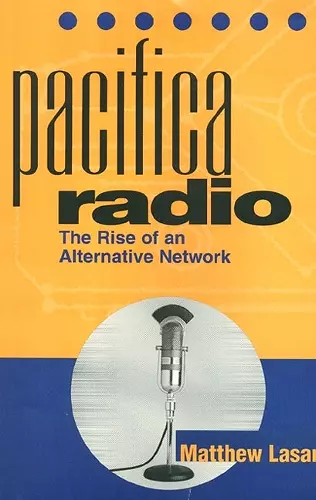Pacifica Radio 2E
Format:Paperback
Publisher:Temple University Press,U.S.
Currently unavailable, and unfortunately no date known when it will be back

A profile of America's first listener-supported alternative radio station
Examines the external pressures and organizational problems within the Pacifica Foundation that led, in early 1999, to the police shutdown of network stations KPFA. This title calls it "the worst crisis in the history of community radio." It is the story of Lewis Hill and the small band of pacifists who in 1946, set out to launch KPFA.In the public radio landscape, the Pacifica stations stand out as inn0ovators of diverse and controversial broadcasting. Pacifica's fifty years of struggle against social and political conformity began with a group of young men and women who hoped to change the world with a credo of non-violence. Pacifica Radio traces the cultural and political currents that shaped the first listener-supported radio station, KPFA FM in Berkeley, and accompanied Pacifica's gradual expansion into a 5 station network. In this expanded paperback edition, Lasar provides a postscript (\u0022A Crisis of Containment\u0022) that examines the external pressures and organizational problems within the Pacifica Foundation that led, in early 1999, to the police shutdown of network station KPFA. Lasar, an admittedly pro-KPFA partisan in the conflict, gives a first-person account, calling it \u0022the worst crisis in the history of community radio.\u0022 Yet Pacifica Radio is about more than just the network's recent troubles. It is the story of visionary Lewis Hill and the small band of pacifists who in 1946, set out to build institutions that would promote dialogue between individuals and nations. KPFA took to the air in 1949 with stunningly unconventional programs that challenged the dreary cultural consensus of the Cold War. No one in the Bay Area, or anywhere else, had heard anything like it on the airwaves. The first edition of Pacifica Radio, which made the San Francisco Chronicle's non-fiction bestseller list, was praised as \u0022fascinating reading\u0022 by In These Times, \u0022Lasar has an eye for paradox, irony and contradiction,\u0022 wrote the Santa Rose Press Democrat, \u0022but he is first and foremost an able and astute historian.\u0022
"Far more than a study of one unusual radio station and its sometimes eccentric cast of characters, this book offers fresh insights on a host of issues essential to understanding modern American culture, from the shift in radicalism toward individualism during the McCarthy era to the rise of the counterculture, and the economics of radio broadcasting. It is enlightening and entertaining and makes a real contribution to the history of postwar America." -Eric Foner, author of The Story of American Freedom "Pacifica Radio: The Rise of an Alternative Network is indispensable reading for anyone who wants to understand what's happening now at KPFA and for all those who would like to know the perils that confront activists who create counter-cultural institutions. ... Lasar has an eye for paradox, irony, and contradiction, but he is first and foremost an able and astute historian, not a satirical novelist, and he does a lot more than air KPFA's dirty laundry. He shows how much the philosophy of the station was shaped in part by the political atmosphere of the Cold War and McCarthyism, though KPFA was opposed to McCarthyism and the Cold War. Pacifica Radio describes all the cultural, political and economic barriers that KPFA had to surmount to get on, and then stay on, the air." -Jonah Raskin, Santa Rose Press Democrat "...a critical assessment of Pacifica's early years... [Lasar's] work represents the kind of detailed scholarship that provides historical narrative with a theoretical underpinning." -H-Net "[Lasar] captures the chaotic excitement of the station's founding in 1949... The book offers contributions and context to those interested in the history of American progressive politics and the history of public broadcasting. And the book will also provide insights to those seeking to understand the passion and politics that public radio can arouse." -The Journal of American History "Pacifico Radio provides a deeper intellectual history of pacifism and the ideological debates of the day." -Whole Earth "Lasar chronicles internal struggles, the most decisive the contest that decided that Pacifica would not be merely the advocate of pacifism but an exemplar of the First Amendment, open to views of many individuals and groups." -Columbia Journalism Review
ISBN: 9781566397773
Dimensions: 229mm x 152mm x 20mm
Weight: unknown
277 pages